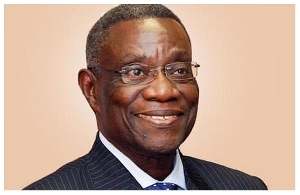Ghanaian motorists continue to enjoy an unprecedented petroleum prices surpluses since the government through the National Petroleum Authority (NPA) started the partial deregulation regime on June 16.
At the seventh consecutive price review, Oil Marketing Companies have again reduced the prices of petroleum products attributed mainly to appreciation of the cedi against other major currencies and the fall in the world oil prices.
The retail prices of petroleum products at Filling Stations has fallen from GH¢ 3.47 per litre for petrol and GH¢ 3.37 per litre for diesel as quoted on June 16 to GH¢ 2.980 per litre for super and GH¢ 2.880 per litre for diesel at the September 16 price review.
A Ghana News Agency team monitoring the fortnight price review in accordance with the petroleum deregulation region revealed that Ghana Oil Company is quoting GH¢ 2.929 per litre for super and GH¢ 2.829 per litre for diesel.
Universal Oil Company Limited is quoting GH¢ 2.939 per litre for super and GH¢ 2.826 for diesel; Engen Ghana Limited has pegged the price at GH¢ 2.950 per litre for super and GH¢ 2.850 for diesel whilst Shell Ghana Limited is selling at GH¢ 2.950 per litre for super and GH¢ 2.860 for diesel.
Allied Oil Company Limited has also pegged the price at GH¢ 2.960 per litre for super and GH¢ 2.850 per litre for diesel, and Total Ghana Limited is quoting GH¢ 2.980 per litre for super and GH¢ 2.880 per litre for diesel.
The prices review of petroleum products is in conformity with the de-regulation of petroleum products.
The NPA has explained that the increment or decrease of petroleum prices is no longer the preserve of the government but is determined by market forces that take into consideration the international price of crude oil, the foreign exchange rate, the fall or rise of the cedi, import duties, taxes and other factors.
According to the NPA it has put in place mechanism to sanctions on Bulk Distribution Companies (BDCs) and OMCs that would go beyond the average price indicated.
In the event that the quality of products is found to have been compromised, it would result in the withdrawal of licences after a third warning.
Meanwhile Dr Raziel Obeng-Okon, a Chartered Licensed International Financial Analyst explained to the GNA that the competition among the BDCs and OMCs has led to reduction in margins and therefore lower prices for final consumers of petroleum products.
He said some vehicle owners and commercial drivers now shop around to buy from OMCs with the lowest prices.
Dr Obeng-Okon noted that prior to deregulation, the OMCs used to blame the NPA for the reduction of margins but the deregulation regime has witnessed lower margins by some OMCs than the pricing regime under the NPA before deregulation.
He said the preceding weeks to the deregulation the NPA reduced the total retail margins from more than 9.00 per cent in April to about 8.00 per cent just before the deregulation.
He noted that currently, some OMCs are making just about 7.00 per cent or less total margin on the ex-pump price to drive volumes.
He said margins are shrinking among the OMCs because buyers have become so sensitive to price than quality.
Dr Obeng-Okon who is also an Economic/Investment Management Consultant said OMCs could no longer blame the NPA for the determination of total retail margins even in the face of increasing ex-pump price.
He said competition and the forces of demand and supply are now the main determinant of the price mechanism.
“Liquidity positions of the OMCs have become very tight as most of them now have a shorter working capital cycle because the BDCs now require earlier payment than before,” he said.
Dr Obeng-Okon noted that some OMCs had to put a stop on using the BDCs monies to fund the construction of service station because working capital has become very essential for their survival.
“To make matters worse for the OMCs, the Special Petroleum Tax (SPT) and OMCs’ Guarantees to Ghana Revenue Authority (GRA), Customs Division have become a further drain on the liquidity of the OMCs.
“Usually, OMCs are expected to pay the 17.5 per cent SPT on their loadings within two weeks whether or not they have sold the products. Sometimes, taxes are paid on unsold products and this is very worrying,” he said.
Dr Obeng-Okon noted however that the payment of SPT also impacts negatively on the guarantee ceilings of OMCs with Customs. “The GRA needs to be sensitive to the plight of the OMCs on the flexibility of enforcing the guarantees before loadings if the deregulation is to be successful”.
He said the deregulation is beneficial to government because it ensures the paying of the outstanding debt of government to the BDCs as well as ensure that government no longer subsidises the cost of fuel.
Under the deregulation, the BDCs have been successful in convincing government and the NPA to remove the Price Stabilisation Margins from the pricing formula.
He explained that the deregulation has also improved the liquidity position of the BDCs through the reduction of credit days for the OMCs.
Dr Obeng-Okon said competition among the BDCs has reduced the ex-refinery prices for the OMCs and thus lower prices for the final consumer.
The regulator needs to monitor the quality of petroleum products as consumers shift their attention to just the price.
Business News of Friday, 18 September 2015
Source: GNA













